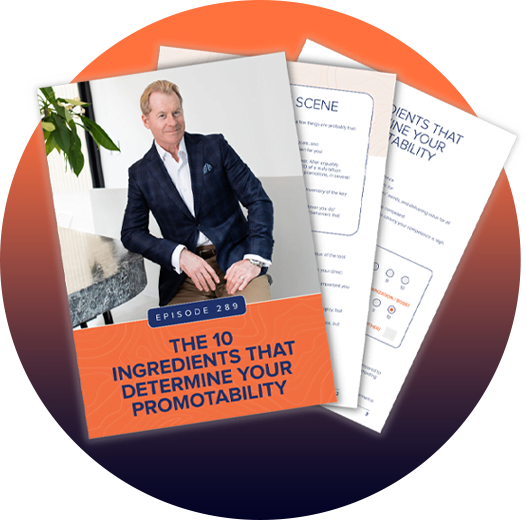With Martin G. Moore

This week’s episode is a big one! Once again I’ve developed a two part episode to deal with what I think is one of our larger topics, The Roadmap to Exceptional Leadership. Shoehorning this topic into a couple of brief podcast episodes is going to be tricky, but I am up for the challenge!
This week in part one, we’ll start by looking at common leadership attributes and competencies, the best place to start when we’re defining what an ‘exceptional leader’ actually is, without all the fluff! In this episode I’ll cover:
The ideal leadership attributes that we so often hear are ‘important’, but are also strangely intangible
The difference that personal perspective makes in creating meaning around leadership attributes
An example of how when I was CEO of CS Energy, I used key descriptors to explain certain attributes to my organisation, providing greater understanding of what behaviour I expected
Why I think that leadership competencies are far more tangible (and relevant) than leadership attributes
Some of the competencies of senior leadership that I learned from my time at Harvard Business School – you can download these competencies for free below to self-evaluate, and evaluate those in your team
I’ll touch on The 7 Pillars of Leadership Performance which will give you an insight into next week’s episode where I’ll give away my ‘secret sauce’ to becoming an exceptional leader!
DOWNLOAD YOUR FREE COPY OF:
THE 13 COMPETENCIES OF LEADERS

Get yours delivered straight to your inbox by filling out the form below 👇
Transcript
I’ve developed a two part episode to deal with what I think is one of the larger topics in leadership. Shoehorning it into a couple of brief podcast episodes is going to be tricky, but I am up for the challenge. This week in part one, we’ll start by looking at common leadership attributes and competencies.
Next week in part two, I’ll introduce you to my 7 Pillars of Leadership Performance model to get to the things that in my experience, differentiate leaders, from incompetent, through mediocre, to great. By the end of next week’s episode, I’ll hope to have cut through the myths, the conventional wisdom and the leadership platitudes to pinpoint the things that really make a difference.
These are the things that will help you to move forward, establish a strong personal brand and become the boss that everyone wants to work for.
The risk with any type of a topic like this is to two fold:
Firstly is the potential to over simplify quite complex concepts and subject areas.
Secondly, we can potentially omit a critical factor that arguably in certain circumstances, is more important than the things we’ve judged and to focus on. Whenever we open the door to a discussion like this, it’s wise to think about it in the context of ‘ceteris paribus’.
Ceteris paribus is a term widely used in economics. Whenever I talk about economics I can’t help but recall the quote from the famous economist JK Galbraith who once said, “The only function of economic forecasting is to make astrology look respectable.” However, any of you who’ve studied economics will be familiar with the Latin term that means all other things being equal. When we talk about leadership attributes that separate great leaders, we assumed that there is an equivalency with your peers in terms of intelligence, education and experience. That is ceteris paribus.
Our subject in this case, the characteristics of great leaders then becomes a point of differentiation. Over and above the need to satisfy the core of requirements and prerequisites of a leadership role. For example, you can’t just turn up in a CEO role with a bunch of humility which is a commonly held and discussed attribute of a great leader these days without the intellect, experience and education to run a business. You will fail as surely as if you exhibited no humility. This is pretty much the same for every discussion on leadership that has ever held. The underpinning capabilities are a prerequisite for success. We touch on this concept indirectly in the episode a few weeks back in Ep. #21 – Education Versus Experience‘.
leadership attributes
There are literally thousands of articles and posts written every week about the attributes of great leaders. Humility, transparency, fallibility and so forth. While it’s fun and interesting to muse on these attributes, they lack clarity. How would a leader embody these attributes and put them into practise? Working out what this means and how you might possibly use it to improve your leadership performance, is about as easy as trying to nail jelly to a cloud. When we see discussions about the attributes of great leaders, the terms bandaid around are awfully intangible. Let’s rattle off a few.
Humility, transparency and openness, vision, courage, integrity, focus, cooperation, perseverance. What do these even mean? Each of this forms a picture in our head of what cooperation is for example, but my idea of this might be vastly different to yours. Let’s face it, some are way more difficult to change than others. For example in my view, courage is teachable and it’s learnable, but integrity is much more difficult to attain. Your life experience grounds you in your personal attributes, values and qualities. It’s only with sustained, long-term and conscious effort and if it minds you that very few people are willing to put in, that they could be changed.
As an example of the integrity attribute, when I was CEO at CS Energy I have to say that of the four corporate values that I put in place, the one that lost a lot in translation was act with integrity. When we rolled the values out and communicated them across the organisation, we included in the communications some examples and explanation for what each value meant.
the four key descriptors of integrity
We challenge each other constructively and respectfully.
We do what we say we will do.
We courageously confront issues and obstacles
We are honest and trustworthy and always act in the best interests of CS Energy.
For me that had a high level of tangibility, but for a bunch of others in the company, not so much. If you have leaders at lower levels of your organisation, who succumb to the prevailing cultural norms, it can be extraordinarily difficult to get them to even understand what you’re talking about. As the famous marathon runner Vladimir Kuts once said:
“Try to explain what it’s like to run a marathon to someone who has never run one is like trying to explain colour to a blind person.”
Always acting the best interest of the company was a classic cultural deviation. As for many years cultural norms in some pockets of the CS Energy business had grown around satisfying self-interest, not around the greater good. As I said, it’s fun and interesting to debate the relative merits and importance of various leadership attributes and qualities, but I find it largely academic. Let’s leave that and move on to talk about leadership competencies.
Leadership competencies in my opinion get closer to the crux of the matter. What do leaders need to competently do, to successfully deliver on the organisational and team goals? I’m in no way suggesting that the discussion on leadership attributes shouldn’t be held or doesn’t have merit, but I am saying that the competency discussion is a little more tangible.
CORE COMPETENCIES FOR LEADERSHIP
When I was at Harvard Business School in 2007, we were exposed to individual coaching that provided an assessment against some of the core competencies for leadership. At that time I found this to be a pretty useful exercise in self-evaluation and reflection. I want to run through some of these that I think we should be thinking about developing. Now I’ll whip through these pretty quickly, but don’t worry I’ll include the list in the free downloadable from this episode so that you can have a think about it a little more deeply if you choose to.
Seasoned Judgement
This talks about the judgement that comes from experience in your industry or chosen field of endeavour. It’s the accumulated knowledge and wisdom that comes from doing something really well for a long period of time. Just be aware of the fallacy of 20 years experience. You see a lot of people are claimed to have 15 or 20 or 25 years of experience. Is it really 20 years of experience? Or is it one year’s experience 20 times over, because quality matters! You have to have that passionate continuous improvement philosophy built into everything you do.
Visionary Thinking
This is all about understanding and simplifying complexity for your people. A lot of leaders don’t have the ability to think contextually at the highest strategic level and this is actually really hard to learn.
Financial Acumen
It really doesn’t matter what type of organisation you’re in, understanding the financial side of things is a prerequisite to being a good leader, because your business will not be sustainable unless it can be financially successful. It doesn’t matter whether you’re in a competitive business, a not for profit, doesn’t matter.
Driving Execution
This is sometimes seen as contrary to all the warm and fluffy leadership attributes that we spoke about earlier. To drive execution and deliver value is the object of the exercise. Without this everything else is just conversation, a nice heartwarming conversation, but a conversation nonetheless.
Tracking and Developing Talent
In episode two of the No Bullsh!t Leadership podcast I dedicated it to building a high performing team, because unless you can do this the higher up you go the harder you’ll find it to achieve anything resembling performance.
Empowering Others
This is a critical element of delegation, accountability and execution once again.
Influencing and Negotiating
Influencing is one of the most critical skills for a leader, because the higher up you go, the less direct control you have over your people’s work and the more you achieve outcomes through influencing others.
Leadership Versatility
This is really all about being resilient to change, because it’s about dealing with changing circumstances and situations. Adapting to different environments, economic conditions, teams and customer preferences. Although just a word on customer preferences, Henry Ford was reputedly once asked why he didn’t produce the model T Ford in any colour other than black. His obstinacy led the interviewer to ask why he didn’t pay more attention to the desires of his customers and Ford replied simply, “If I ask my customers what they wanted, they would have asked me to produce a faster horse.”
Organisational Relationships
You can’t get far in a modern organisation without a bunch of workable and productive relationships across the whole organisation. They are too complex in their structure. I’ve seen many a promising executive be brought undone by a fail in this area. I used to say to my team, if you can’t earn the trust and respect of your peers, I can’t help you with that.
Inspiring Trust
Now this is dangerously close to an attribute, but it’s a core competency for leading people and establishing relationships with key stakeholders. Be they your superiors, your customers or the communities in which you operate.
Fostering Open Dialogue
This is a much underrated competency, but it’s critical in harnessing the power of the great team you have built. Now quick shout out to the executive team at Mitchell Services that I had the pleasure of talking to a couple of weeks ago. This is a team that has clearly embraced and embodied the use of open dialogue to drive better outcomes for the business and to doing a great job with it.
Mature Confidence
This is a cracker. The humility bandwagon that everyone is riding at the moment is dangerous in that one might be under the misapprehension that any sort of confidence is undesirable. I really love the term mature confidence.
The word mature indicates a few things, first of all you don’t believe your own bullsh!t, so in other words you’ve got a level of self-awareness. You have your confidence in check, you understand the role that luck and timing play, but you aren’t a shrinking violet. You’ll make decisions without fear or favour. Let’s face it, you need confidence to enable you to face the adversity that builds your resilience. More to the point, your people need to have confidence in you. There’s a certain amount of confidence and control that underpins a great leader’s ‘grace under pressure’.
Cross functional capability
The higher up you go, the more important it is that you develop a broad perspective on your industry and organisation. As a CEO or if any of you aspire to run a major organisation, one of the most important elements of your toolkit is going to be a strong understanding of all functional disciplines.
In next week’s episode we will cover the concept of the 7 Pillars of Leadership Performance. We’ll concentrate part two of this episode exclusively on that. You can see that leadership competencies are a great way to understand what’s needed to become competent in the leadership space. It’s much more tangible than the vague discussion about so called critical attributes that seem to dominate today’s leadership psyche.
Even when it comes to the discussion of competencies, I describe this as necessary, but not sufficient. Self-evidently there are an incredible number of leaders who exhibit all the major competencies but are still not great leaders. What’s my secret sauce? The 7 Pillars of Leadership Performance. This combine leadership imperatives, behaviours, competencies and core principles into a simple but powerful framework that will help you to bring everything together. Now obviously as I believe that this is the cracks of the matter in building better leaders, this is the focus and structure for our online education program, Leadership Beyond the Theory which I’m sure you’ve heard us mention previously. If this hits the spot for you, go and check it out on our website.
the seven pillars
1. Deliver Value
This is the object of the exercise and where it all begins and ends with value creation.
2. Handle Conflict
Conflict aversion is one of the biggest career killers and it’ll basically dilute your effectiveness and pretty much everything you do as a leader. Add to that the fact that you really won’t enjoy your leadership career if you are conflict adverse.
3. Build Resilience
Leaders who lack resilience can’t earn the respect of their people and they can therefore never execute to their potential.
4. Work at Level
It is so common to see leaders through all levels of an organisation working at the wrong levels, sub-optimising their performance and effectively crippling their people.
5. Master Ambiguity
One of the foremost jobs of a leader is to sit comfortably in ambiguity and translate that into certainty of direction and action for their people.
6. Drive Accountability
If you want your people to execute well, nothing enables this more than clear, well defined, single point accountabilities.
7. Make Great Decisions
Leaders get paid the dizzy dollars to make the hard calls. Being a leader who can make timely, well informed decisions will put the team and organisation in a winning position.
RESOURCES AND RELATED TOPICS:
Ep #21: Education vs. Experience – Listen Here
Ep #2: Building a High Performance Team – Listen Here
Explore other podcast episodes – Here
Take our FREE Level Up Leadership Masterclass – Start now
Leadership Beyond the Theory- Learn More
YOUR SUPPORT MATTERS
Here’s how you can make a difference:
Subscribe to the No Bullsh!t Leadership podcast
Leave us a review on Apple Podcasts
Repost this episode to your social media
Share your favourite episodes with your leadership network
Tag us in your next post and use the hashtag #nobsleadership


